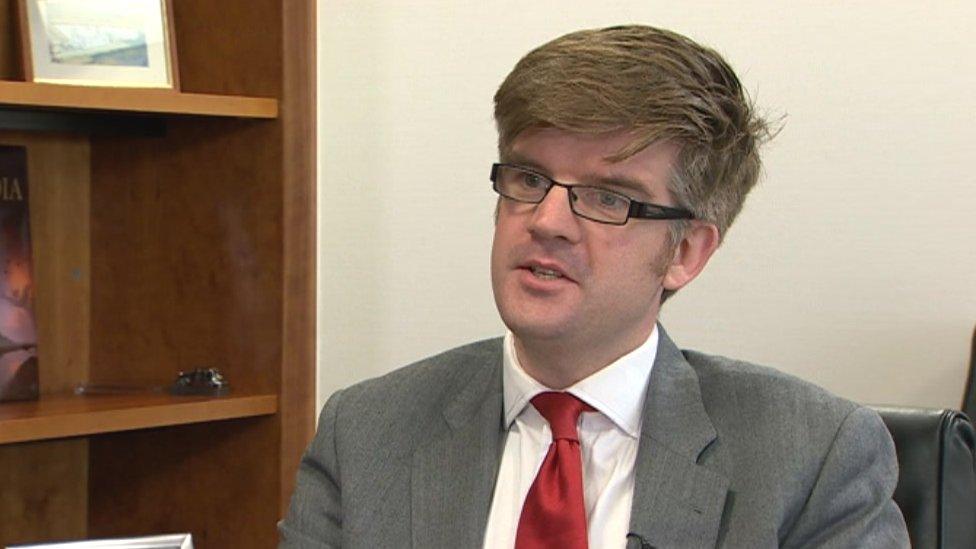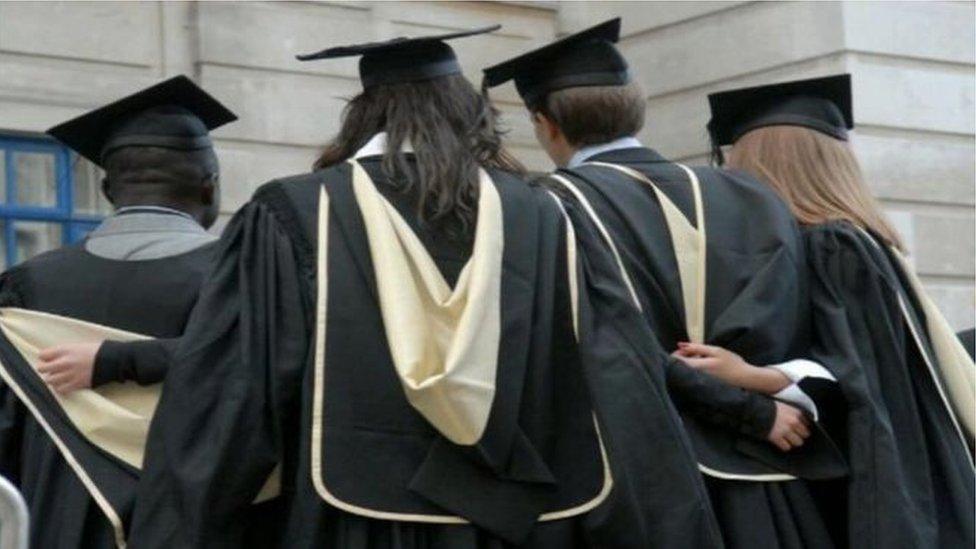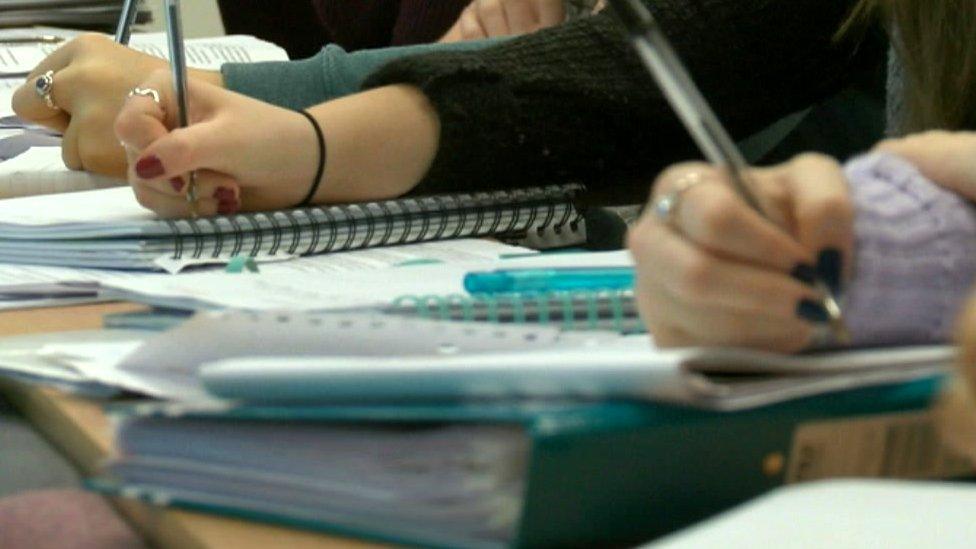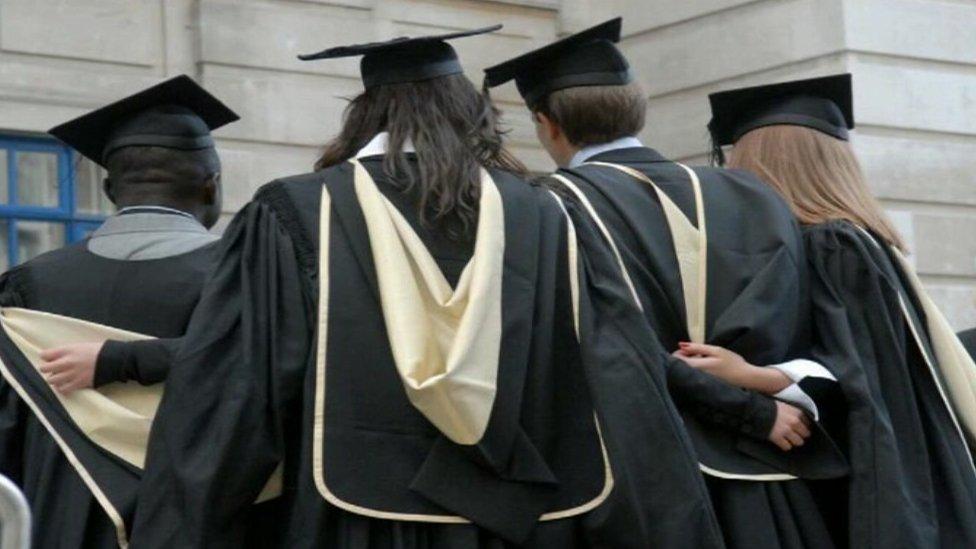Student finance system 'must change', review suggests
- Published
Prof Ian Diamond says there is a dispute over subsidies for Welsh students at English universities
Keeping the current student finance arrangements in Wales is "not an option", most of the evidence to a major review indicates.
Grants of up to £5,190 are available towards tuition fees, usually £9,000.
Welsh universities have said the grants - costing £229m in 2014-15 - could be better spent helping poor students.
Prof Sir Ian Diamond said Welsh students had less debt than those from England but there was a "lack of consensus on the way forward".
Summarising the evidence his review had received, external, Sir Ian said a "range of suggestions" for changes had been made, but "most respondents recognise that there is no easy solution and that difficult choices will have to be made".
Education Minister Huw Lewis said the interim report "identifies the key themes arising from that evidence" but "does not make any judgement about the validity or significance of that evidence".
Mr Lewis announced the Diamond review in November 2013, saying it was right to take stock at a time of "rapid and unpredictable change" for universities, but the final report is not due until September 2016.
Universities have argued the grant means tens of millions of pounds leaves the higher education sector in Wales and goes to colleges in England.
They recommend means-tested grants to help poorer students meet their living costs would be better.
'Disadvantaging Wales'
Dr David Blaney, chief executive of the body funding Welsh universities - the Higher Education Funding Council for Wales - called Sir Ian's report a "good distillation of the evidence submitted so far".
"We are very keen to see the final conclusions of this review, and we are optimistic that the outcomes of this evidence-based policymaking process will indeed reflect the need to ensure a world-class Welsh higher education system which supports jobs and growth," he said.
Conservative Shadow Education Minister Angela Burns said Labour ministers' current policy "only serves to gather vast amounts of Welsh public money and dump it at the front door of English universities".
"All the while, our HE [Higher Education] sector continues to struggle," she said.
"It's unfair - it's disadvantaging Wales - and it's got to stop."
Welsh Liberal Democrat spokesman Aled Roberts said he believed the evidence backed his party's call for an approach to student finance "based on living costs rather than tuition fees".

How it works elsewhere
Scottish students get free tuition at Scottish universities, along with students from any other EU country, except for those from the rest of the UK, who have to pay.
Scottish students going to university elsewhere have to pay tuition fees but can apply for loans of up to £9,000 a year.
Northern Irish students pay tuition fees of up to £3,805 a year to study in Northern Ireland, and up to £9,000 elsewhere in the UK. Loans are available to pay these fees, but no grants.
Students from England have to pay tuition fees at any UK university but can apply for loans of up to £9,000 a year.

Analysis by Tomos Livingstone, BBC Wales political unit

Today is in some ways is the easy part - as Sir Ian Diamond says, almost everyone agrees that the status quo is not an option.
That status quo is based on a simple principle: wherever Welsh university students go to study, the Welsh government pays out - a Welsh student studying in England pays the first £3,500 of the fee, with the Welsh government paying the rest.
Simple and popular with recipients it may be, but it's expensive - one estimate is of a cost of £3.6bn over the next five years. And around £90m a year goes across the border to England; it's not difficult to see why Welsh universities aren't thrilled about that.
Now the tough part - what better system is out there? Transferring the cost back to the students brings Wales into line with England, but will lead to protests; paying the subsidy only to students who stay in Wales will lead to criticism of parochialism.
A tough call for the party manifesto writers as they prepare for May's elections - although the Conservatives have already promised to scrap the subsidy.
And they can't turn back to Sir Ian for the answer - his final report, the one with the recommendations, won't be published until after polling day.
- Published10 December 2015

- Published9 December 2015

- Published30 November 2015

- Published29 November 2015

- Published11 October 2015

- Published16 February 2015

- Published18 November 2013
